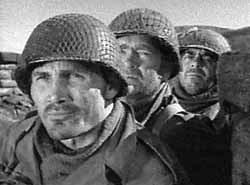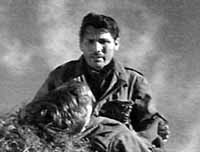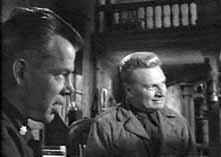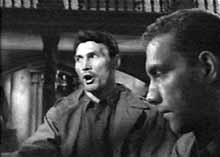Aldrich's Attack has no traditional heroes. There are no men-of-action
sent to blow up a bridge or take a valuable hill or pillbox. His narrative
with its dark greys and crisp blacks, portrays a group of grunts trying to
survive in Europe, 1944. Their problem: commanding officer Captain Cooney
(Eddie Albert) is a coward and can't be trusted. Visually, Aldrich sets up
Cooney's fractured state of mind. When first introduced, Cooney is filmed from
behind, sitting in a jeep. His face is invisible as his hand flexes at his
side and he refuses to act to save several of Lt. Costa's men. By making the
visible invisible, Aldrich presents Cooney as being unwhole, unmanly.
 Jack Palance as Joe Costa, in sweat-stained t-shirts, grime, and self-confident indifference, is all manliness. The entire patrol respects the lieutenant, and some of the film's best scenes occur when the angular muscle of
Palance crosses with the bourbon flab of Albert. As they play a "friendly"
game of poker, Costa's offscreen stares, grunts and mumblings about Albert's
masculinity create an intense unease. Later, following a patrol briefing for taking a small, German farmhouse, Palance makes the unease fully known. He walks toward Albert and says he'll
take the house, but if Albert "once more plays the gutless wonder" and refuses
to back him up, then he'll return and kill him. This is a confrontation hardly
explored in war films.
Jack Palance as Joe Costa, in sweat-stained t-shirts, grime, and self-confident indifference, is all manliness. The entire patrol respects the lieutenant, and some of the film's best scenes occur when the angular muscle of
Palance crosses with the bourbon flab of Albert. As they play a "friendly"
game of poker, Costa's offscreen stares, grunts and mumblings about Albert's
masculinity create an intense unease. Later, following a patrol briefing for taking a small, German farmhouse, Palance makes the unease fully known. He walks toward Albert and says he'll
take the house, but if Albert "once more plays the gutless wonder" and refuses
to back him up, then he'll return and kill him. This is a confrontation hardly
explored in war films.
Costa's buddy, Lt. Woodruff (William Smithers) attempts to deal with
this leadership problem by telling the Lt. Colonel (Lee Marvin) that Cooney is
unfit for command. But the army hierarchy is even more corrupt than the
shortcomings of the captain. Marvin, an old buddy of Cooney's rich Southern
father, wants a cushy stateside job after the war and the way to get it is to
make Cooney a war hero. Besides, he tells Woodruff not to worry; they won't
see any more action. However, moments later they're told to move out and
Woodruff brutally realizes that he's trapped with a bad captain and within the
darker web of the armed forces.
Whereas Woodruff may be frustrated, Costa boils. He takes the house and awaits Cooney's back-up. But Cooney, immobile at headquarters, paces, drinks too much bourbon and says he can't take chances. Eventually Cooney
cracks, embraces his slippers, tells Woodruff how his Dad tried to whip manhood
into him, and collapses into a bed. Costa, in the meantime, held up in a house
surrounded by Germans and Panzers takes out his rage on a captured German
captain. When the officer smugly refuses to cooperate, Costa grabs him by the
collar and throws him out the front door where he's machine-gunned by his own
men. The gesture mirrors what Costa would like to do to Cooney. It's brutal,
intense and not quite how we expect to see our fighting forces on film.
 After several soldiers die and Cooney refuses to provide support, Costa and his men must retreat or die. And with revenge becoming an all-consuming passion, Costa goes looking for Cooney. However, we soon find out Cooney isnít just a coward, but a sadistic bastard who takes glee in torturing a wounded man in the presence of other soldiers.
After several soldiers die and Cooney refuses to provide support, Costa and his men must retreat or die. And with revenge becoming an all-consuming passion, Costa goes looking for Cooney. However, we soon find out Cooney isnít just a coward, but a sadistic bastard who takes glee in torturing a wounded man in the presence of other soldiers.
Aldrich, like many of the great directors: John Ford, Sam Fuller,
Howard Hawks and Robert Altman, loves to play with the rules of the genre,
balancing repetition with innovation. Aldrich's Kiss Me Deadly (1955) shattered
the romanticism of the detective myth, making Mike Hammer into a brutal thug and
presenting a misanthropic, dizzying world heading for disaster. It's the only
detective film of its time to weave into the center of its plot a
science-fiction emphasis: "Manhattan Project, Trinity, Los Alamos." The Big Knife (1955), also with Palance, showed the ugliness of the star system and how
studio chiefs and their associates can murder insignificant players and
blackmail bigger ones in order to maintain a profit margin and own a star.
Attack has the manly look of a war film: sturdy fight scenes, wonderfully
high-angled long shots of alienation, and plenty of existential angst. True to
the war film's code it upholds a notion of an essential masculinity and punishes
a coward by converting him into a sadistic monster. But in pursuit of its
central theme--poor command and corrupt decision-making--Attack's mortar shells
really hit their mark.
Attack is available from MGM/UA Home Video for $14.95.











 Jack Palance as Joe Costa, in sweat-stained t-shirts, grime, and self-confident indifference, is all manliness. The entire patrol respects the lieutenant, and some of the film's best scenes occur when the angular muscle of
Palance crosses with the bourbon flab of Albert. As they play a "friendly"
game of poker, Costa's offscreen stares, grunts and mumblings about Albert's
masculinity create an intense unease. Later, following a patrol briefing for taking a small, German farmhouse, Palance makes the unease fully known. He walks toward Albert and says he'll
take the house, but if Albert "once more plays the gutless wonder" and refuses
to back him up, then he'll return and kill him. This is a confrontation hardly
explored in war films.
Jack Palance as Joe Costa, in sweat-stained t-shirts, grime, and self-confident indifference, is all manliness. The entire patrol respects the lieutenant, and some of the film's best scenes occur when the angular muscle of
Palance crosses with the bourbon flab of Albert. As they play a "friendly"
game of poker, Costa's offscreen stares, grunts and mumblings about Albert's
masculinity create an intense unease. Later, following a patrol briefing for taking a small, German farmhouse, Palance makes the unease fully known. He walks toward Albert and says he'll
take the house, but if Albert "once more plays the gutless wonder" and refuses
to back him up, then he'll return and kill him. This is a confrontation hardly
explored in war films.
 After several soldiers die and Cooney refuses to provide support, Costa and his men must retreat or die. And with revenge becoming an all-consuming passion, Costa goes looking for Cooney. However, we soon find out Cooney isnít just a coward, but a sadistic bastard who takes glee in torturing a wounded man in the presence of other soldiers.
After several soldiers die and Cooney refuses to provide support, Costa and his men must retreat or die. And with revenge becoming an all-consuming passion, Costa goes looking for Cooney. However, we soon find out Cooney isnít just a coward, but a sadistic bastard who takes glee in torturing a wounded man in the presence of other soldiers.





